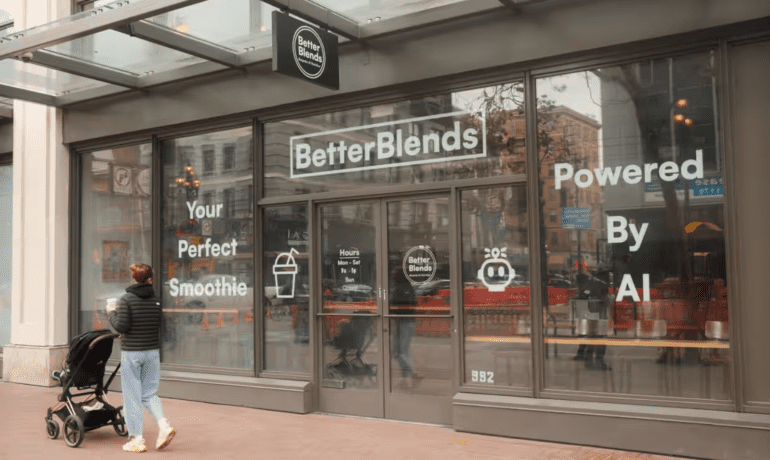TL;DR:
- BetterBlends, an AI-driven smoothie shop, opened in San Francisco amid much excitement.
- Within two months, it mysteriously closed, leaving questions unanswered.
- Positive press surrounded its opening, showcasing its innovative AI-powered smoothie concept.
- Google Maps reviews revealed mixed opinions about the shop’s operations.
- San Francisco’s economic challenges and high vacancy rates added to the uncertainty.
- The closure of BetterBlends highlights the difficulties facing retail businesses in the city.
- The future of BetterBlends remains uncertain, with plans to implement its AI technology elsewhere.
- Despite the hype, it appears that the shop’s smoothies may not have lived up to expectations.
Main AI News:
In September, BetterBlends burst onto the San Francisco scene, promising to revolutionize the world of smoothies with the power of artificial intelligence. A bespoke AI nutrition store, it aimed to provide customers with personalized smoothie concoctions generated by AI algorithms. The buzz surrounding its opening was palpable, with positive press coverage and excitement in the air.
BetterBlends marketed itself as “Your Smoothie, powered by AI,” a concept that garnered attention for its innovative use of AI technology. The AI model took customer orders and preferences, crafting unique smoothie recipes that were then expertly blended by co-founders Michael Parlato and Clayton Reynolds in the shop. The fusion of technology and taste seemed like a recipe for success.
However, just a few weeks later, the store’s promise seemed to have withered away. On October 20th, the locked doors of BetterBlends displayed a sign declaring “temporarily closed,” with the promise of reopening in an hour. Yet, sources in the neighborhood revealed that the closure had extended for over three weeks. By the following Monday, the sign had vanished, and the shop’s interior had been stripped of blenders, fruits, vegetables, and other supplies—everything needed to make a smoothie, with or without AI. Only a lonely trashcan and a few plants remained as a testament to the shop’s brief existence.
The store’s Google Maps listing mirrored the real-world challenges BetterBlends faced. Reviews showcased a mixed bag of opinions, with one customer lamenting the owners’ inconsistency in operating hours and abrupt changes. Some were pleased, awarding BetterBlends with four or five stars. Interestingly, the shop owners had posted images of their smoothies on the Google Maps page, along with pictures of seemingly happy customers, seemingly generated by AI. The images had a surreal quality, with soft, glossy lighting on the customers’ faces and unrecognizable fruit blobs in the store window. The plastic cups featured nonsensical characters and lumpy smoothie mixtures, comically oversized in the customers’ hands, with one hand even having only three oddly elongated fingers. It appeared that AI image generation had its limitations, especially when it came to lifelike human features.
The closure of BetterBlends unfolded against the backdrop of San Francisco’s ongoing struggles. The city faced one of the slowest economic recoveries from the COVID-19 pandemic in the United States. BetterBlends had chosen Market Street, one of the hardest-hit areas, as its location. The shop’s opening had initially sparked hope, as many saw the burgeoning AI sector as a potential savior for a city grappling with economic challenges.
Co-founder Clayton Reynolds had expressed optimism about their decision, saying, “People really like the idea of us betting on San Francisco.” However, it seemed that this bet didn’t pay off as expected.
Christian Cecena, an employee of the neighboring coffee shop, confirmed that the “be back in an hour” sign had been a fixture on BetterBlends’ door for weeks. A member of a local community outreach group stationed nearby reported that the shop’s longest consecutive opening period had been only two weeks. “Then that sign went up, and we never saw them again,” Cecena lamented, highlighting the importance of businesses in the area’s revitalization.
As of October 25th, San Francisco still listed BetterBlends in its database of active food service establishments, but the shop’s abrupt closure mirrored the city’s struggle with high office and retail vacancy rates.
The closure of BetterBlends, though attention-grabbing, is not necessarily indicative of the entire downtown landscape. The city has made efforts to rejuvenate empty storefronts through grants and tax incentives, although BetterBlends did not benefit from these initiatives. Across the street from BetterBlends, Ikea had recently opened a six-story retail, food, and co-working center, converting vacant office space into apartments, signaling a different trend.
Stijn Van Nieuwerburgh, the economist who had warned of a potential “doom loop” for San Francisco, emphasized the importance of successful retail stores in the city’s recovery. While the AI sector shows promise, San Francisco still has a long way to go in terms of office vacancy rates.
The future of BetterBlends remains uncertain. It’s unclear if the shop ever intended to stay open for an extended period. The co-founders had previously worked at Local Kitchens, a food technology startup, and had sought funding to implement BetterBlends’ technology into apps and other businesses. The shop’s website only provided an email address for those interested in contributing to the “next generation of dining.”
On a Friday morning, as BetterBlends sat empty, customers flowed in and out of the neighboring coffee shop, which also offered smoothies at a competitive price. “I hate to say this, but I did hear that the smoothies weren’t that good,” remarked Christian Cecena, shedding light on the challenges that BetterBlends may have faced in delivering on its AI-infused promise.

Screenshot of likely AI-generated image from AI-powered smoothie shop BetterBlends’ Google Maps listing. Source: Screenshot/BetterBlends
Conclusion:
BetterBlends’ closure serves as a cautionary tale for businesses looking to blend AI technology with traditional retail. While the concept garnered initial excitement, it failed to sustain its presence in a challenging market. This underscores the importance of consistent operations, quality products, and adaptability for success in the evolving business landscape of San Francisco.

